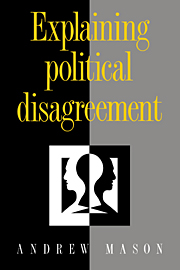Book contents
- Frontmatter
- Contents
- Preface
- Acknowledgements
- Introduction
- 1 Differences in values
- 2 The notion of an essentially contested concept
- 3 The miscommunication thesis
- 4 Integrating rational and non-rational explanations
- 5 A model for explaining some moral and political differences
- Concluding remarks
- Appendix
- Bibliography
- Index
1 - Differences in values
Published online by Cambridge University Press: 18 December 2009
- Frontmatter
- Contents
- Preface
- Acknowledgements
- Introduction
- 1 Differences in values
- 2 The notion of an essentially contested concept
- 3 The miscommunication thesis
- 4 Integrating rational and non-rational explanations
- 5 A model for explaining some moral and political differences
- Concluding remarks
- Appendix
- Bibliography
- Index
Summary
One of the most common explanations for the extent and persistence of political disagreement exploits the idea that political differences, such as those which arise out of allegiances to competing conceptions of justice, rest upon differences in values. On this view, political disputes are intractable (largely if not entirely) because they involve disputes over values and disputes of this kind, unlike disputes over facts, are not rationally resolvable. It conforms to the contestability conception of how we should account for the intractability of political disagreement since it holds that moral and political thought is by its very nature open to dispute because of its value-ladenness.
Not all political disputes involve disputes over values. Some are concerned simply with the most efficient means to a shared goal. For example, people may disagree about the best means to reduce the level of unemployment in a society: they may agree that this is an important goal and about its significance in relation to other goals, but nevertheless disagree about the most efficient means to realize it. Many political disputes are value-laden, however. Some have to do with questions of justice, with what sort of institutions or arrangements a society morally ought to adopt.
- Type
- Chapter
- Information
- Explaining Political Disagreement , pp. 16 - 46Publisher: Cambridge University PressPrint publication year: 1993



